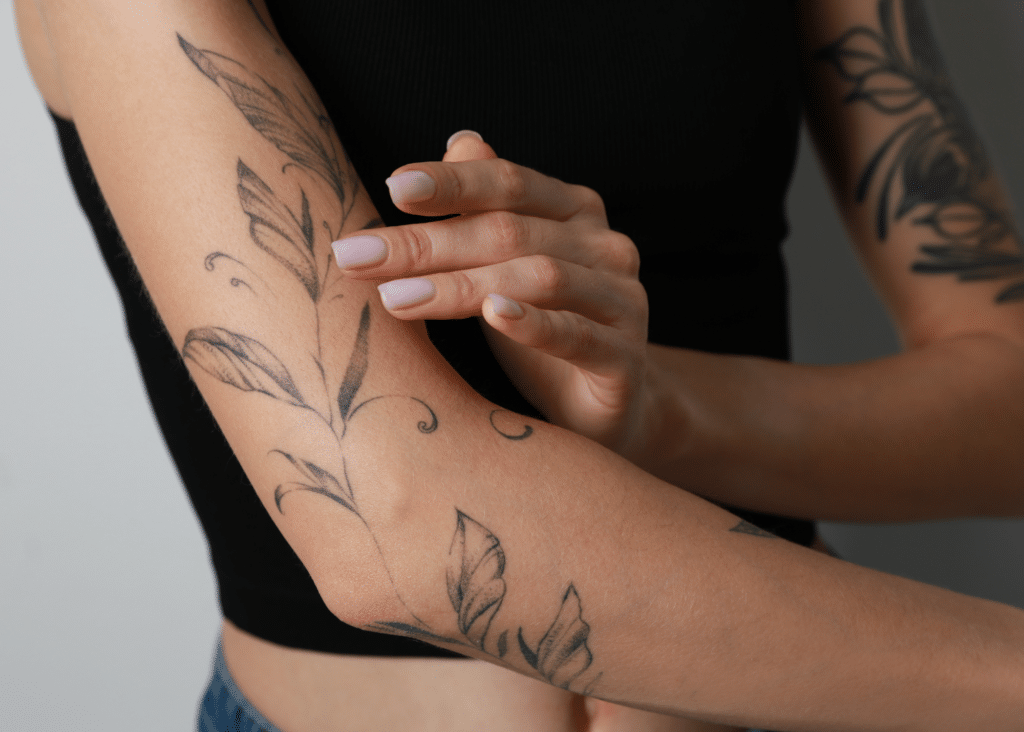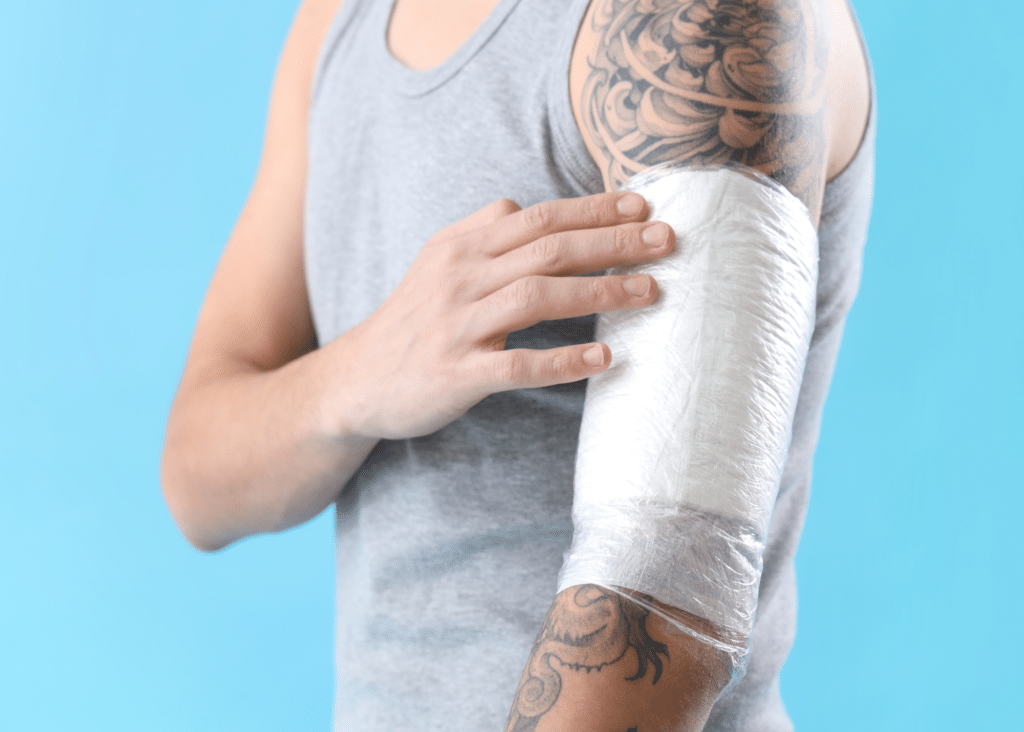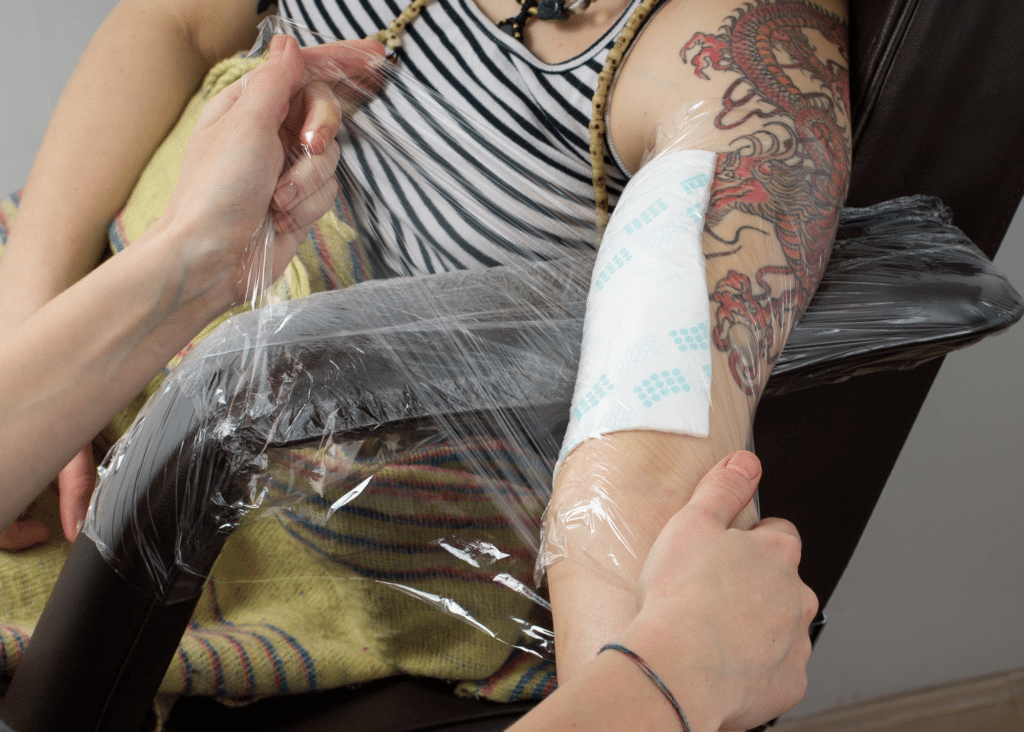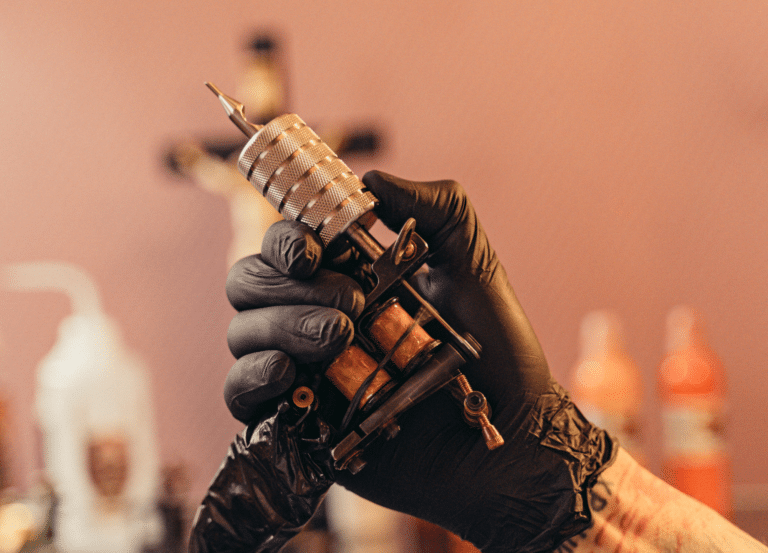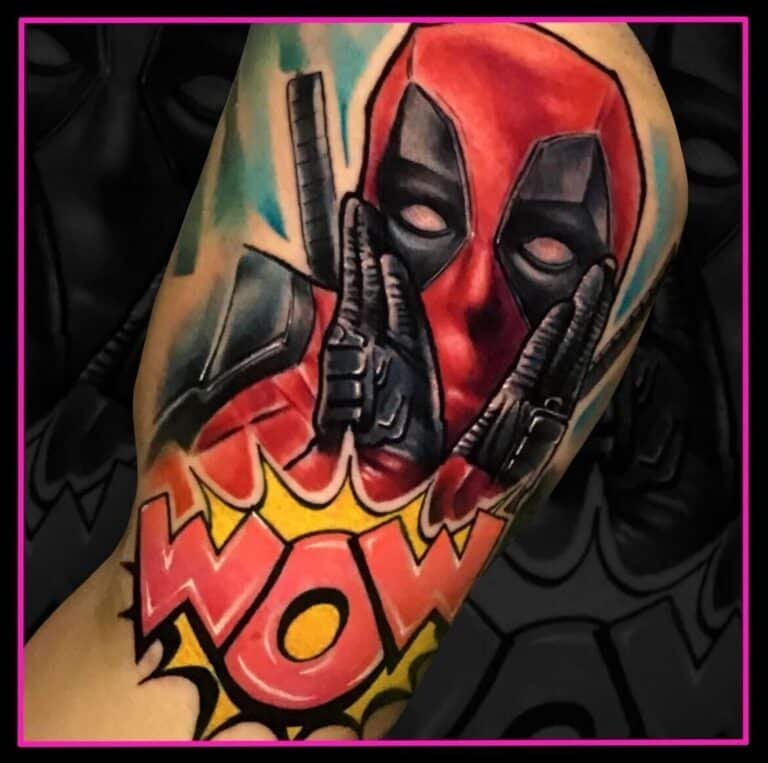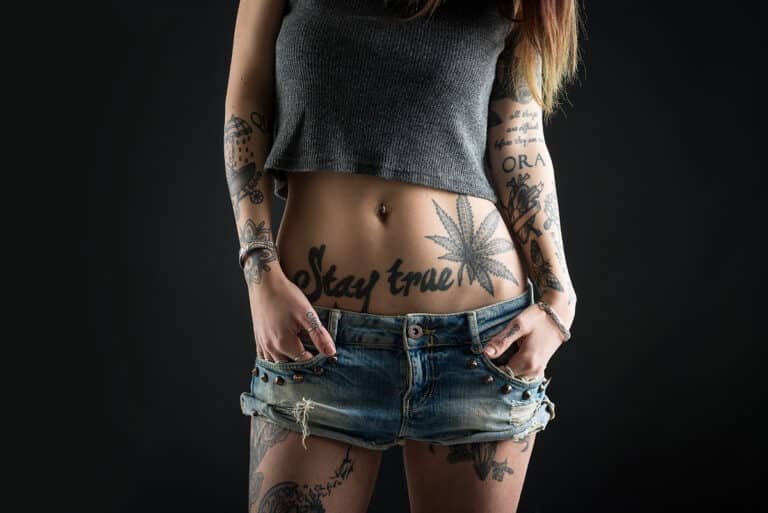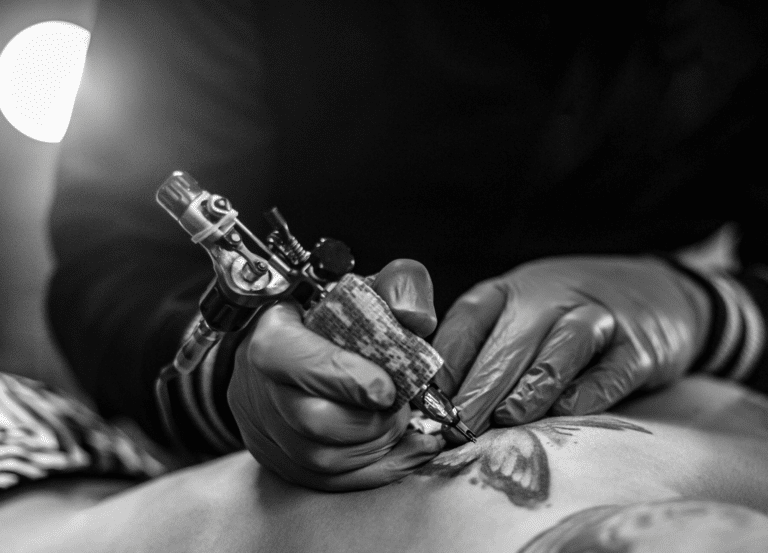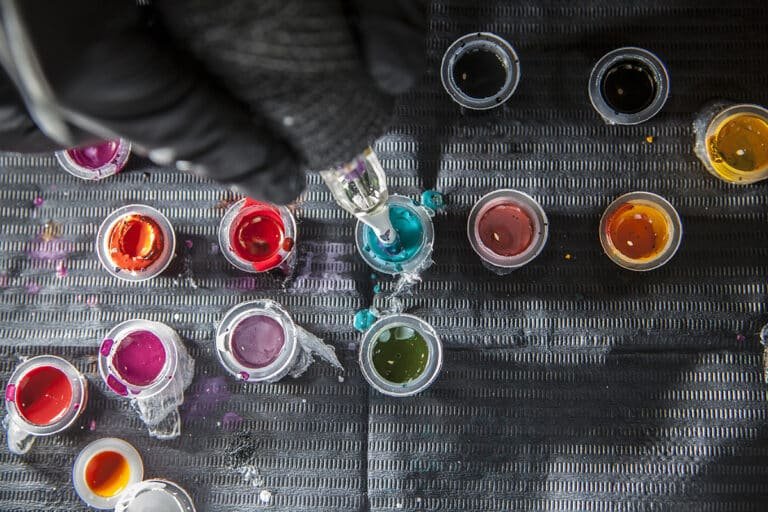The healing time for a tattoo can vary widely depending on several factors, including the size and location of the tattoo, the individual’s skin type, and the aftercare routine followed. Generally speaking, the tattoo healing process involves multiple stages such as inflammation, itching, and peeling, as the skin recovers from the open wound created by the tattooing needles. Understanding these tattoo healing stages is crucial to ensure that your tattoo heals properly and looks its best once fully healed. A knowledgeable tattoo artist can provide valuable guidance on what to expect during the healing process and offer personalized tips on how to care for your new tattoo. So, if you’re interested in learning more about tattoo healing and how to support your skin’s recovery, read on!
Caring for a New Tattoo
To properly care for a new tattoo, it’s essential to keep the healing tattoo clean and dry to support the skin’s recovery. Begin by gently washing the tattooed skin with warm water and antibacterial soap to remove any dirt or bacteria without causing irritation. After washing, carefully pat the area dry with a clean towel—avoid rubbing, which can damage the delicate skin. Since a fresh tattoo is essentially an open wound, it requires careful attention during the healing stages to prevent infection and promote optimal healing.
Applying a fragrance-free ointment or cream helps keep the tattoo moisturized, which prevents excessive dryness and reduces the risk of a burning sensation or irritation. Moisturizing also aids the skin as it heals and helps the tattoo to heal evenly and vibrantly. It’s important to avoid direct sun exposure during this time, as ultraviolet rays can damage the tattooed skin and slow down the healing process. Additionally, steer clear of hot tubs, swimming pools, and harsh chemicals, which can irritate the skin and potentially cause infections.
A consistent tattoo aftercare routine should include daily cleaning, moisturizing with appropriate products, and protecting the tattoo from sun exposure and other environmental factors. By following these steps, you’ll support your tattoo as it heals through its various stages, ensuring that your new ink remains vibrant and healthy as the skin fully recovers.
Tattoo Healing Stages: What to Expect
The tattoo healing stages are a natural part of the body’s response to the trauma caused by getting a tattoo. Understanding these stages can help you care for your new ink properly and ensure it heals completely. The healing process typically spans two to four weeks, but the timeline can vary depending on factors such as tattoo size, location, and individual skin type.
Stage 1: The First Few Hours to About a Week
Immediately after getting a tattoo, your body reacts to the needle punctures by treating the area as an open wound. During the first few hours, you may notice slight inflammation and the tattooed skin may appear red, swollen, and puffy. This is a normal immune response as blood rushes to the site to begin healing. A thin layer of plasma and ink may ooze from the tattoo, which is a natural part of the healing process.
Stage 2: Skin Begins to Repair and Flaky Skin Appears
Within about a week, the outer layer of your skin starts to heal. The tattooed area may develop dry skin and flaky skin as dead skin cells begin to shed. This peeling is a sign that your skin cells are regenerating beneath the surface. It’s important not to pick or scratch the flaky skin to avoid damaging the tattoo.
Stage 3: Dry Skin and Itching
As the skin continues to repair, dryness and itching are common. The tattooed skin may feel tight and uncomfortable due to dry skin. Applying a fragrance-free moisturizer can help soothe the skin and support the healing process.
Stage 4: Outer Layer Heals Completely
Over the course of two to four weeks, the outer layer of skin fully heals. While the surface may look healed, the deeper layers of skin are still repairing. During this time, the tattoo may appear less vibrant due to the thin layer of healing skin but will regain its true color as the skin cells fully regenerate.
By understanding these tattoo healing stages and caring for your tattoo accordingly, you can help ensure your new ink heals beautifully and lasts for years to come.
Applying Ointment and Creams
Applying ointment or cream to a new tattoo plays a vital role in promoting a healing tattoo and preventing infection. It is essential to choose a fragrance-free and non-comedogenic ointment or cream specifically designed for tattoo aftercare to ensure it does not clog pores or irritate the skin. When applying, use a thin, even layer over the tattoo and surrounding skin to keep the area moist, which supports the skin’s natural healing process. Reapply as needed, especially whenever the tattoo feels dry, to maintain hydration. Avoid petroleum-based products, as they can trap moisture excessively, cause irritation, and delay healing.
Additionally, protecting your tattoo from direct sunlight is crucial during the healing period, so continue applying moisturizer or lotion regularly while keeping the tattoo shielded from UV exposure. If you’re interested in recommendations, our tattoo artists at Rad Ink are happy to share their preferred ointments and creams and let you know where to purchase them—many of which are available right here in our shop.
Making Sure You’re Healing Properly
To ensure your tattoo heals properly, it is crucial to maintain a clean and moisturized tattooed skin throughout the tattoo healing process. Gently washing the tattoo with warm water and antibacterial soap helps remove dirt and bacteria without causing irritation. After cleaning, applying a fragrance-free moisturizer or ointment keeps the skin hydrated, which supports healing and prevents excessive dryness or burning sensations.
Protecting the surrounding skin from irritation and infection is equally important. Avoid covering your tattoo with bandages or tight clothing after the initial dressing is removed, as this can trap sweat, cause irritation, and delay healing. Allowing your tattoo to breathe promotes a healthier healing environment.
During the healing period, resist the urge to pick at scabs or peeling skin, as this can introduce bacteria, lead to infection, and potentially damage the tattoo, affecting its appearance once healed. Following a consistent tattoo aftercare routine, including wearing SPF and applying sunscreen once the tattoo is fully healed, helps protect your skin from harmful UV rays and preserves the vibrancy of your new ink.
Additionally, maintaining a healthy diet and lifestyle can promote faster healing by supporting your body’s natural recovery processes. Staying hydrated, eating nutrient-rich foods, and avoiding smoking or excessive alcohol consumption all contribute to the tattoo healing process and the quality of healed tattoos.
Allergic Reactions and Complications
Allergic reactions and complications can occur during the tattoo healing process, especially if the tattoo is not properly cared for. An early sign of a problem may include prolonged redness, swelling, or severe itching around the tattooed skin. You might also notice oozing fluid or discharge from the area, which can indicate an infection or allergic response. If you experience any of these symptoms, it’s important to treat the tattooed skin promptly with an appropriate antibiotic ointment or cream to prevent further complications. However, if the tattoo isn’t healing properly or these signs persist, seeking medical attention is essential to ensure proper care and avoid long-term damage. Your tattoo artist can provide valuable guidance on how to recognize and manage allergic reactions and complications, helping you maintain the health and appearance of your new ink.
So, How Long To Fully Heal After a New Tattoo?
In short, the tattoo healing process involves several stages—from the initial inflammation and oozing during the first few hours to the peeling, itching, and eventual full healing of the skin over the course of two to four weeks. Keep in mind that larger tattoos and those placed on areas of the body that move frequently or are exposed to friction may take longer to heal, while small tattoos typically heal faster. Regardless of the size or placement, each stage is a vital part of your skin’s natural recovery and ensures that your new ink remains vibrant and beautiful. Though the healing process requires patience and care, it’s all worth it for the stunning, lasting tattoo you’ll proudly wear.
Ready To Get Some New Ink?
If you’ve been debating getting a new tattoo for a while now, trust us – don’t overthink it any longer—it’s time to take the plunge and get some new ink! Come visit us at Rad Ink, where you’re going to love all of our amazing artists ready to bring your tattoo ideas to life.
So quit making excuses and let’s get this party started! Find us at 760 W New Haven, Melbourne, Florida 32901. For appointments or questions, call us at (321) 499-3357 or visit www.radinkflorida.com. Your next unforgettable tattoo experience awaits at Rad Ink!
Rad FAQs
How long does it take for a new tattoo to fully heal?
The healing process for a new tattoo typically takes about two to four weeks for the outer layer of skin to fully heal. However, deeper layers of skin can continue to repair for several months. Proper tattoo aftercare, including cleaning and applying lotion, helps ensure your healing tattoo recovers well.
What should I expect during the first week of healing?
During the first week, your tattooed skin may appear red, swollen, and may ooze plasma or ink. This is a normal part of the healing process. It’s important to keep the area clean and moisturized by gently washing and applying fragrance-free lotion to support skin repair.
Do small tattoos heal faster than larger ones?
Yes, small tattoos generally have a shorter healing time because they cover less skin area and cause less trauma. While small tattoos may heal on the surface within two weeks, larger or more intricate tattoos may take longer to fully heal.
How does tattoo ink affect the healing process?
Tattoo ink is deposited into the dermis layer of the skin, which triggers the body’s healing response. Proper care during the healing process ensures the ink remains intact and vibrant as your skin recovers.
Is applying lotion important during tattoo healing?
Absolutely. Applying a fragrance-free, non-comedogenic lotion helps keep the healing tattoo moisturized, reduces dryness and itching, and supports the skin’s natural repair process. Regular application during the healing time is essential for optimal results.
How can I tell if my tattoo isn’t healing properly?
If you notice prolonged redness, swelling, severe itching, or oozing beyond the first two weeks, it may indicate an infection or allergic reaction. Consult your tattoo artist or a healthcare professional to address any concerns and ensure your healing tattoo recovers safely.

